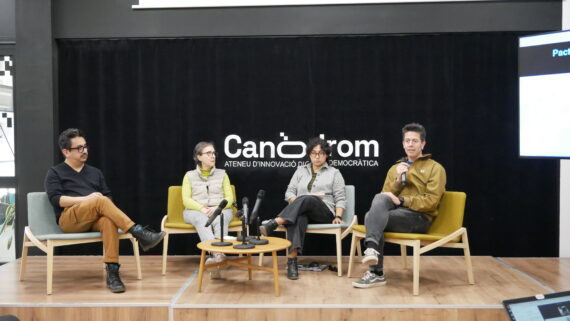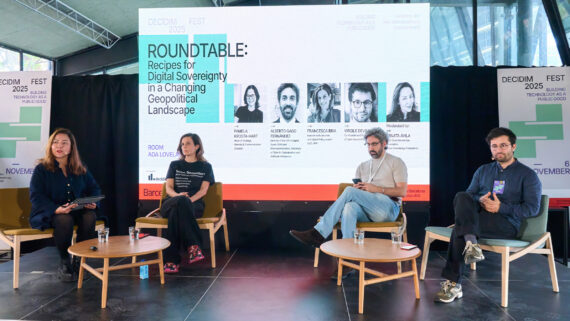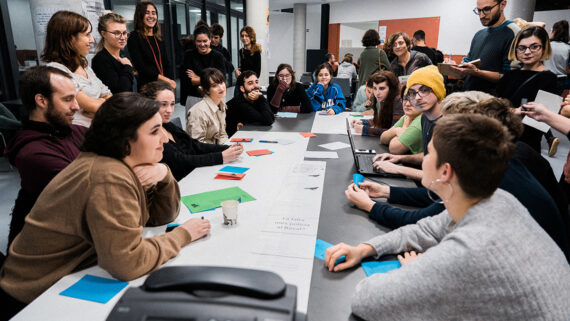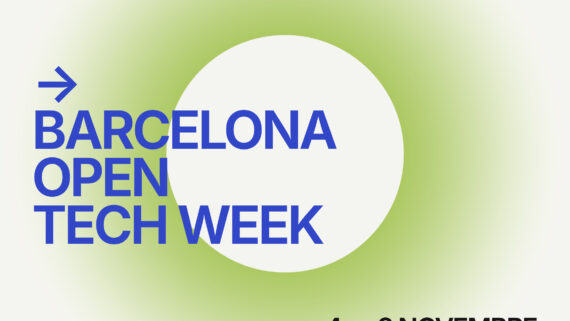
We speak with Xabier E. Barandiaran, a thinker passionate about the intersection of philosophy, technology, and democracy. Co-founder of the Decidim project and former coordinator of the Democratic Innovation Directorate at Barcelona City Council between 2016 and 2018, Xabier invites us to reflect on how technological tools can empower citizens and revitalize our democracies.
In this conversation, Xabier reflects on the evolution of Decidim and how it has transformed the way people interact with power and decision-making. It has become a space where collective intelligence can change our relationship with technology and among individuals, offering an encouraging perspective on the future of citizen participation to envision a world in which we can actively engage in democratic processes.
How did the Decidim project start, and what factors or movements influenced its creation?
To understand the evolution of Decidim, it is essential to look back at its origins and its digital life. The interesting part is that Decidim is the result of many converging ideas. It cannot be explained without the political and technological context in which it emerged, where social and technological movements intertwined. There is no single figure or specific moment, as in the Silicon Valley myths, where one individual, like Bill Gates, is portrayed as the great creator. In this case, its origin is more collective.
As for influences, they are also diverse. The hacktivist and hacker movement, which emerged in laboratories and occupied social centers, played a crucial role. Then there is the free software movement, which is connected to this origin but with more professionalized branches. We cannot forget the importance of the 15M movement, which had a technopolitical and institutional translation, especially in Barcelona.
How did all this connect with Barcelona, and what role did technology and large companies play in it?
Barcelona provided an ideal context for the birth of Decidim, as it is a city known for its technological innovation and a hub for programmers and digital innovation projects on a global scale. In this environment, we tried to create a broader network with the municipalist movement governing various cities at that time. However, we couldn’t establish a common project with Madrid, even though their software was open source. Finally, we adapted the code to Barcelona’s needs, and thus Decidim was born.
Big tech companies accumulate immense capital and exert significant control over the digital environment. Decidim was conceived as a response to these forms of digital domination. From social movements and in collaboration with the public sector, we recognized the need to build a democratic infrastructure to address this situation. Initially, we used the code from Decide Madrid, which was later called CONSUL Community, but soon we realized we required a more collaborative platform open to other organizations. So, we reprogrammed the entire system, leading to Decidim.org, and later developed Meta Decidim, with the goal of having the community itself govern the software, using Decidim to manage itself. This self-reflexivity was a great success.
You mentioned that Decidim has grown beyond being just software. What has been the key to Decidim’s success and expansion, and what other aspects would you highlight?
Undoubtedly, community growth has been the main driving force. Decidim is not just software; it is a community that sustains it, improves it, and extends it to other institutions. This is what has allowed Decidim to be used in places as diverse as Brazil, New York, Japan, France, and even in the French National Assembly. The community has been essential in providing support, maintaining the project’s principles, and ensuring its continuous evolution.
Decidim has evolved from being a participation portal to becoming a much broader community space. Today we have the Decidim Fest, which started as Meta Decidim workshops and later evolved into Jam sessions. This community growth is central to the software’s success and quality, and is what has allowed it to be used in a wide variety of contexts and institutions. Now the software is translated into multiple languages, and there are companies, associations, and international entities that actively contribute to its development.
Over the years, what has Decidim achieved in terms of democratic quality?
The question is complex because Decidim, as a technopolitical project, encompasses multiple dimensions that directly impact democratic quality. We have created infrastructure that enables more sophisticated and distributed participation processes. For example, the Barcelona Municipal Action Plan has channeled approximately 20,000 proposals into 5,000 projects, mobilizing hundreds of thousands of people in its implementation. This meticulous tracking of initiatives provides an unprecedented level of traceability and accountability, facilitating more active and transparent participation.
Additionally, projects like the Som Energia cooperative demonstrate how Decidim can manage decision-making in complex contexts, involving more than 50,000 members in an effective participatory process. Thus, we offer an alternative to proprietary models that centralize decision-making, allowing democracy to be strengthened in our societies. One of the most exciting moments was when the Brazilian government adopted Decidim to manage an instance with over 3 million users. This scalability is an unprecedented achievement for us. Now, the challenge is to better integrate this large community with the global Meta Decidim network. Although this process requires time and effort, the future is promising, with the potential to further strengthen participatory democracy on a global scale.
What is the impact of Decidim on society, and how does it relate to the technological perspective, considering collective intelligence and associated risks?
Decidim’s impact is remarkable in transforming democracy, integrating technology and social participation. However, our societies are increasingly governed by technology, making it crucial to hybridize technopolitics with democracy. Decidim’s true power lies in democratizing both society and technology. This is vital because, without this duality, it is difficult to advance democratic quality.
Moreover, we face a crisis of representative democracy, where social power is digitally articulated, but these infrastructures are often centralized and privatized. Decidim has managed to resist the privatization of democratic space, allowing technology to be used in an accessible and collaborative way. In a context where artificial intelligence is presented as a product that privatizes human knowledge, Decidim emerges as an alternative that fosters collective intelligence. Thus, its success lies not only in what it has achieved but also in what it has prevented, offering a model where democracy can flourish in the digital era.







